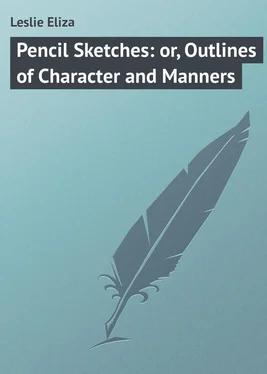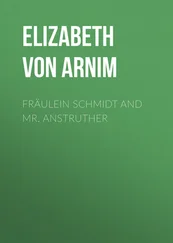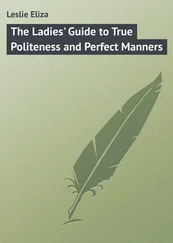Eliza Leslie - Pencil Sketches - or, Outlines of Character and Manners
Здесь есть возможность читать онлайн «Eliza Leslie - Pencil Sketches - or, Outlines of Character and Manners» — ознакомительный отрывок электронной книги совершенно бесплатно, а после прочтения отрывка купить полную версию. В некоторых случаях можно слушать аудио, скачать через торрент в формате fb2 и присутствует краткое содержание. Жанр: foreign_prose, foreign_humor, на английском языке. Описание произведения, (предисловие) а так же отзывы посетителей доступны на портале библиотеки ЛибКат.
- Название:Pencil Sketches: or, Outlines of Character and Manners
- Автор:
- Жанр:
- Год:неизвестен
- ISBN:нет данных
- Рейтинг книги:3 / 5. Голосов: 1
-
Избранное:Добавить в избранное
- Отзывы:
-
Ваша оценка:
- 60
- 1
- 2
- 3
- 4
- 5
Pencil Sketches: or, Outlines of Character and Manners: краткое содержание, описание и аннотация
Предлагаем к чтению аннотацию, описание, краткое содержание или предисловие (зависит от того, что написал сам автор книги «Pencil Sketches: or, Outlines of Character and Manners»). Если вы не нашли необходимую информацию о книге — напишите в комментариях, мы постараемся отыскать её.
Pencil Sketches: or, Outlines of Character and Manners — читать онлайн ознакомительный отрывок
Ниже представлен текст книги, разбитый по страницам. Система сохранения места последней прочитанной страницы, позволяет с удобством читать онлайн бесплатно книгу «Pencil Sketches: or, Outlines of Character and Manners», без необходимости каждый раз заново искать на чём Вы остановились. Поставьте закладку, и сможете в любой момент перейти на страницу, на которой закончили чтение.
Интервал:
Закладка:
"I have not had that happiness," replied Mr. Smith with a simpering laugh, as he rose from the old stump, and, forgetting that it was not a chair, tried to hand it to Myrtilla. She bowed in acknowledgment, placed herself on the seat – and for awhile endeavoured to entertain Mr. Smith, as he stood leaning (not picturesquely) against a portion of the broken fence.
In the mean time Mrs. Quimby continued to call on the attention of those around her. To some the old lady was a source of amusement, to others of disgust and annoyance. By this time they all understood who she was, and how she happened to be there. Fixing her eyes on a very dignified and fashionable looking young lady, whom she had heard addressed as Miss Lybrand, and (who with several others) was sitting nearly opposite, "Pray, Miss," said Aunt Quimby, "was your grandfather's name Moses?"
"It was," replied the young lady.
"Oh! then you must be a granddaughter of old Moses Lybrand, who kept a livery stable up in Race street; and his son Aaron always used to drive the best carriage, after the old man was past doing it himself. Is your father's name Aaron?"
"No, madam," said Miss Lybrand – looking very red – "My father's name is Richard."
"Richard – he must have been one of the second wife's children. Oh! I remember seeing him about when he was a little boy. He had a curly head, and on week days generally wore a gray jacket and corduroy trowsers; but he had a nice bottle-green suit for Sunday. Yes, yes – they went to our church, and sat up in the gallery. And he was your father, was he? Then Aaron must have been your own uncle. He was a very careful driver for a young man. He learnt of his father. I remember just after we were first married, Mr. Quimby hiring Moses Lybrand's best carriage to take me and my bridesmaids and groomsmen on a trip to Germantown. It was a yellow coachee with red curtains, and held us all very well with close packing. In those days people like us took their wedding rides to Germantown and Frankford and Darby, and ordered a dinner at a tavern with custards and whips, and came home in the evening. And the high-flyers, when they got married, went as far as Chester or Dunks's Ferry. They did not then start off from the church door and scour the roads all the way to Niagara just because they were brides and grooms; as if that was any reason for flying their homes directly. But pray what has become of your uncle Aaron?"
"I do not know," said the young lady, looking much displeased; "I never heard of him."
"But did not you tell me your grandfather's name was Moses?"
"There may have been other Moses Lybrands."
"Was not he a short pockmarked man, that walked a little lame, with something of a cast in his right eye: or, I won't be positive, may be it was in the left?"
"I am very sure papa's father was no such looking person," replied Miss Lybrand, "but I never saw him – he died before I was born – "
"Poor old man," resumed Mrs. Quimby, "if I remember right, Moses became childish many years before his death."
Miss Lybrand then rose hastily, and proposed to her immediate companions a walk farther into the woods; and Myrtilla, leaving the vicinity of Mr. Smith, came forward and joined them: her friends making a private signal to her not to invite the aforesaid gentleman to accompany them.
Aunt Quimby saw them depart, and looking round said – "Why, Mr. Smith – have the girls given you the slip? But to be sure, they meant you to follow them!"
Mr. Smith signified that he had not courage to do so without an invitation, and that he feared he had already been tiring Miss Cheston.
"Pho, pho," said Mrs. Quimby, "you are quite too humble. Pluck up a little spirit, and run after the girls."
"I believe," replied he, "I cannot take such a liberty."
"Then I'll call Captain Cheston to introduce you to some more gentlemen. Here – Bromley – "
"No – no," said Mr. Smith, stopping her apprehensively; "I would rather not intrude any farther upon his kindness."
"I declare you are the shame-facedest man I ever saw in my life. Well, then, you can walk about, and look at the trees and bushes. There's a fine large buttonwood, and there's a sassafras; or you can go to the edge of the bank and look at the river and watch how the tide goes down and leaves the splatter-docks standing in the mud. See how thick they are at low water – I wonder if you couldn't count them. And may be you'll see a wood-shallop pass along, or may be a coal-barge. And who knows but a sturgeon may jump out of the water, and turn head over heels and back again – it's quite a handsome sight!"
Good Mr. Smith did as he was bidden, and walked about and looked at things, and probably counted the splatter-docks, and perhaps saw a fish jump.
"It's all bashfulness – nothing in the world but bashfulness," pursued Mrs. Quimby; "that's the only reason Mr. Smith don't talk."
"For my part," said a very elegant looking girl, "I am perfectly willing to impute the taciturnity of Mr. Smith (and that of all other silent people) to modesty. But yet I must say, that as far as I have had opportunities of observing, most men above the age of twenty have sufficient courage to talk, if they know what to say. When the head is well furnished with ideas, the tongue cannot habitually refrain from giving them utterance."
"That's a very good observation," said Mrs. Quimby, "and suits me exactly. But as to Mr. Smith, I do believe it's all bashfulness with him. Between ourselves (though the British consul warrants him respectable) I doubt whether he was ever in such genteel society before; and may be he thinks it his duty to listen and not to talk, poor man. But then he ought to know, that in our country he need not be afraid of nobody: and that here all people are equal, and one is as good as another."
"Not exactly," said the young lady, "we have in America, as in Europe, numerous gradations of mind, manners, and character. Politically we are equal, as far as regards the rights of citizens and the protection of the laws; and also we have no privileged orders. But individually it is difficult for the refined and the vulgar, the learned and the ignorant, the virtuous and the vicious to associate familiarly and indiscriminately, even in a republic."
The old lady looked mystified for a few moments, and then proceeded – "As you say, people's different. We can't be hail fellow well met, with Tom, Dick, and Harry – but for my part I think myself as good as anybody!"
No one contradicted this opinion, and just then a gentleman came up and said to the young lady – "Miss Atwood, allow me to present you with a sprig of the last wild roses of the season. I found a few still lingering on a bush in a shady lane just above."
"'I bid their blossoms in my bonnet wave,'"
said Miss Atwood – inserting them amid one of the riband bows.
"Atwood – Atwood," said Aunt Quimby, "I know the name very well. Is not your father Charles Atwood, who used to keep a large wholesale store in Front street?"
"I have the happiness of being that gentleman's daughter," replied the young lady.
"And you live up Chestnut now, don't you – among the fashionables?"
"My father's house is up Chestnut street."
"Your mother was a Ross, wasn't she?"
"Her maiden name was Ross."
"I thought so," proceeded Mrs. Quimby; "I remember your father very well. He was the son of Tommy Atwood, who kept an ironmonger's shop down Second street by the New Market. Your grandfather was a very obliging man, rather fat. I have often been in his store, when we lived down that way. I remember once of buying a waffle-iron of him, and when I tried it and found it did not make a pretty pattern on the waffles, I took it back to him to change it: but having no other pattern, he returned me the money as soon as I asked him. And another time, he had the kitchen tongs mended for me without charging a cent, when I put him in mind that I had bought them there; which was certainly very genteel of him. And no wonder he made a fortune; as all people do that are obliging to their customers, and properly thankful to them. Your grandfather had a brother, Jemmy Atwood, who kept a china shop up Third street. He was your great-uncle, and he married Sally Dickison, whose father, old Adam Dickison, was in the shoemaking line, and died rich. I have heard Mr. Quimby tell all about them. He knew all the family quite well, and he once had a sort of notion of Sally Dickison himself, before he got acquainted with me. Old Adam Dickison was a very good man, but he and his wife were rather too fond of family names. He called one of his daughters Sarah, after his mother, and another Sarah, after his wife; for he said 'there couldn't be too many Sally Dickisons.' But they found afterwards they could not get along without tacking Ann to one of the Sarahs, and Jane to the other. Then they had a little girl whom they called Debby, after some aunt Deborah. But little Debby died, and next they had a boy; yet rather than the name should be lost, they christened him Debbius. I wish I could remember whether Debbius was called after the little Debby or the big one. Sometimes I think it was one and sometimes t'other – I dare say Miss Atwood, you can tell, as you belong to the family?"
Читать дальшеИнтервал:
Закладка:
Похожие книги на «Pencil Sketches: or, Outlines of Character and Manners»
Представляем Вашему вниманию похожие книги на «Pencil Sketches: or, Outlines of Character and Manners» списком для выбора. Мы отобрали схожую по названию и смыслу литературу в надежде предоставить читателям больше вариантов отыскать новые, интересные, ещё непрочитанные произведения.
Обсуждение, отзывы о книге «Pencil Sketches: or, Outlines of Character and Manners» и просто собственные мнения читателей. Оставьте ваши комментарии, напишите, что Вы думаете о произведении, его смысле или главных героях. Укажите что конкретно понравилось, а что нет, и почему Вы так считаете.












